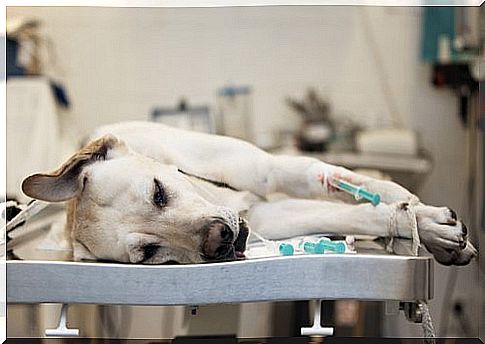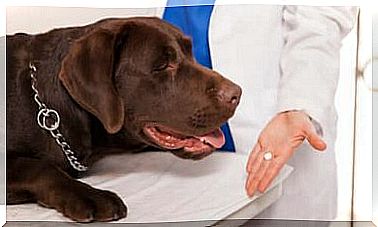Canine Hepatitis: Causes, Symptoms And Treatment

The liver is a very important organ in the body of all animals. It is exactly the same with dogs. It works for them in a similar way as it does for people. How does hepatitis affect our dog?
A dog’s liver is responsible for the following tasks:
- The breakdown of fats, carbohydrates and proteins.
- Assistance with the storage of vitamins and minerals.
- It plays a fundamental role in digestion.
- The liver is responsible for detoxifying and removing harmful substances.
- It makes substances that enable blood to clot.
These are its main functions. According to experts, however, the dog liver performs more than 1,000 tasks in the body of our fur-noses, which is why they can be described as vital.
¿What is dog hepatitis ?
It is an inflammation of the liver. During the inflammatory process, the cells of this organ can suffer various types of damage.

causes
There are several reasons a dog can develop hepatitis . This includes:
- Uptake of urine, feces or saliva from infected animals.
- Poor diet.
- Poisoning from food or medication.
Depending on the cause, dog hepatitis is divided into different types:
Types of canine hepatitis
Common hepatitis: Inflammation of the liver is caused by taking medicine or a toxic substance that can damage the liver. Unfortunately , the symptoms do not show up until the disease has progressed.
Autoimmune Hepatitis: This type of hepatitis is caused by a “flaw” in the dog’s immune system. Your dog’s natural defense system will mistake liver cells for pests and destroy them.
Viral hepatitis in dogs: It is also called Hepatitis Contagiosa Canis or Rubarth’s disease. It is caused by canine adenovirus 1. Both foxes and dogs can become infected through contact with the saliva or feces of infected animals.
It is a strong, resistant and very contagious pathogen that can even kill the animal.
Symptoms of hepatitis in the dog
The symptoms of this disease can be confused with those of many other diseases. The owner should keep an eye on his dog and if in doubt, see the veterinarian.
Some symptoms are:
- Loss of appetite
- Vomiting and / or diarrhea
- Constant or insatiable thirst
- Pain or inflammation in the abdominal area
- Swelling of the lymph nodes
- Loss of coordination
- Yellow discoloration of the eyes and mucous membranes. This symptom is very easy to spot.
The symptoms do not all appear at the same time or with the same intensity.
treatment
Treatment for canine hepatitis, as with most conditions, is related to its cause. It is of course always best to prevent and vaccinate.
Treatment of common hepatitis:
The vet will prescribe symptomatic treatment to prevent pain or other discomfort. You could say that this type of liver infection is the easiest to treat. The expert will investigate whether there is a factor to consider so that the animal does not get sick again. During treatment, the dog must adhere to a strict diet, which is also prescribed by the veterinarian.

Treatment of autoimmune hepatitis:
The symptoms are treated: The dog is prescribed medication to control the functions of its immune system. The drugs used here are called immunomodulators and they are responsible for preventing liver damage.
Treatment of viral hepatitis:
Anti-inflammatory and antibiotic medications are prescribed to help the dog fight secondary infections. This virus cannot be eradicated entirely, so it is necessary to counteract all symptoms. In particular, vomiting and diarrhea can be relieved by the drugs .
In addition, the dog should adhere to a strict nutrition plan. If you have liver disease, it must be low in protein. Of course, our fur nose also needs a lot of rest time while suffering from the symptoms of this disease.
prevention
Healthy dog habits help prevent diseases. This includes:
- Balanced diet
- Daily training
- Daily exercise outdoors
- Caresses and attention
In the case of viral hepatitis, the best prevention is vaccination. You should therefore bring the dog to the vet regularly since it was a puppy so that it receives all the necessary vaccinations. If you adopt an adult dog, you should also get it vaccinated.









